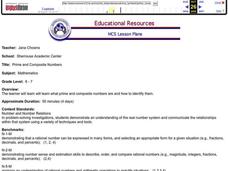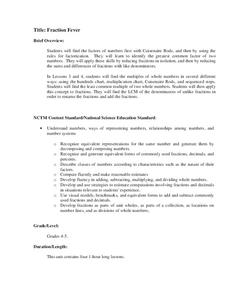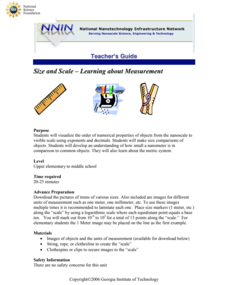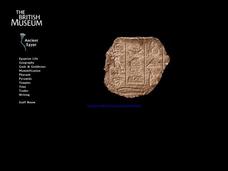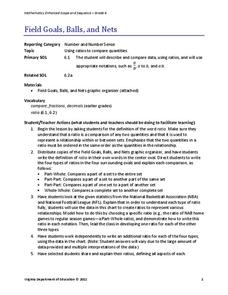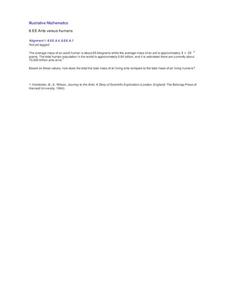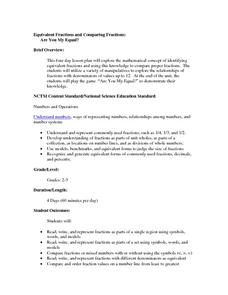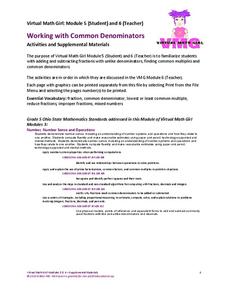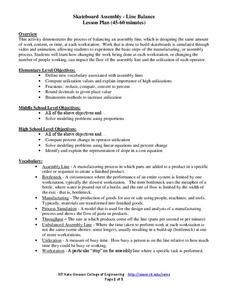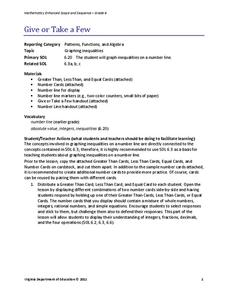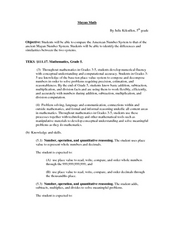Curated OER
Prime and Composite Numbers
Prime and composite numbers are the focus of this mathematics lesson. In it, learners practice techniques for identifying these two types of numbers. They utilize the Inspiration program to complete a task that is clearly explained, and...
National Security Agency
Fraction Fever
This unit on fractions allows for upper-aged elementary learners to explore ways to find the greatest common factor and least common multiple of two numbers. Ultimately, young mathematicians will be able to identify equivalent fractions,...
National Nanotechnology Infrastructure Network
Size and Scale – Learning about Measurement
Can you visualize one billionth of a meter? It's not easy to understand the scale of a nanometer. Learners use a hands-on lesson to develop an understanding of the size of a nanometer in comparison to common objects. They walk away with...
Illustrative Mathematics
Reasoning about Multiplication and Division and Place Value, Part 2
The learner puts reasoning and estimation to work. The directions are to place a decimal in the answer to make the equation true. Pupils are to look at the two problems, one multiplication and one division, and estimate an answer. No...
Arizona Department of Education
Area and Perimeter of Regular and Irregular Polygons
Extend young mathematicians' understanding of area with a geometry lesson on trapezoids. Building on their prior knowledge of rectangles and triangles, students learn how to calculate the area of trapezoids and other irregular...
Curated OER
Drinking Juice
Pictures, number lines, decimal equivalents, or Cuisenaire rods can be used to show insight into the meaning of multiplying fractions.Here, Alisa drinks 3/4 of 1/2 liter of juice. To find the total volume of the juice that Alisa drank,...
Virginia Department of Education
Field Goals, Balls, and Nets
Score a resource on ratios. Young mathematicians learn about different ways to express ratios. Using sports data, they write statements about the statistics in ratio form.
Benjamin Franklin High School
Saxon Math: Algebra 2 (Section 3)
In this third of a twelve-part series, the focus moves from using matrices to solving systems of equations with substitution and elimination, including more than two dimensions and variables in equations, and analyzing statistical data....
Curated OER
The Gear Game
Students discuss that the conservatin of energy states that the energy imput must equal the energy output. They then figure out how can a machine help you to perform task otherwise considered impossible? Students discuss the six simple...
Curated OER
The History of Mathematics
Research the interrelationship between math and science. Search the Internet to discover the history of several branches of mathematics and make text-to-world connections between the concepts covered in each branch with related...
Illustrative Mathematics
Ants Versus Humans
You would think that humans make up more mass than ants do on this planet, but think again, and this time by performing calculations. Middle schoolers use scientific notation to compute and compare the estimated total mass of all humans...
Curated OER
Gold-Worthy Ideas for the Upcoming Games
Gather some ideas for bringing the Winter Olympics into your classroom.
Curated OER
Equivalent Fractions and Comparing Fractions
How can you tell if fractions have equal value? Use various collaborative activities to demonstrate the ways to determine whether or not fractions are equivalent.
PBS
Working with Common Denominators: Activities and Supplemental Materials
Enjoy these straightforward and simple worksheet pages that practice with different denominators. The practice starts simple with adding fractions together and then works on a recipe that needs to be tripled.
Rochester Institute of Technology
Skateboard Assembly - Line Balance
Utilize the lesson on utilization. The second installment of a nine-part technology/engineering series teaches scholars about the flow of a balanced assembly line and the definition of utilization. Videos, activities, and simulations...
Inside Mathematics
Winning Spinners
Winning a spin game is random chance, right? Pupils create a table to determine the sample space of spinning two spinners. Individuals determine the probability of winning a game and then modify the spinners to increase the probability...
Inside Mathematics
Marble Game
Pupils determine the theoretical probability of winning a game of marbles. Individuals compare the theoretical probability to experimental probability for the same game. They continue on to compare two different probability games.
EngageNY
Estimating Digits in a Quotient
Boiling down any division problem to a one-digit divisor problem sure makes estimation easy. The lesson shows how to estimate division problems by using place value understanding and basic arithmetic facts to simplify the division. Some...
EngageNY
The Relationship of Addition and Subtraction
Add an outstanding resource to your repertoire. The first installment of a 36-part module looks at the relationship between addition and subtraction through an activity using tape diagrams. Pupils develop the identities w – x + x = w and...
Virginia Department of Education
Give or Take a Few
Young mathematicians extend their knowledge of rational numbers on a number line to graph inequalities by first using number cards to compare rational numbers. They finish by using similar reasoning to graph inequalities on a number line.
Curated OER
Converting With Mixed Fractions
In this math worksheet, students solve the problems that are related to the converting of mixed fractions. The sheet is intended as a teacher's guide.
Curated OER
Decimal Multiplication
In this math learning exercise, learners can work out problems that require multiplication in multiple steps. The sheet is a teacher's guide.
Curated OER
Students' Strides
Complete problems using base ten blocks to see the difference in the place value of a decimal and how it affects a number's value. Learners compare decimal values as well. Ample time for discussion and modeling are allowed in the...
Curated OER
Mayan Math
Fifth graders investigate the Maya's as mathematicians. In this Mayan math lessons, 5th graders work with the ancient Mayan numbering system by comparing it to the American Number System. They tell the differences and similarities...


